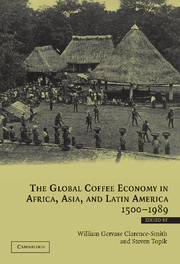Book contents
- Frontmatter
- Contents
- World coffee production
- Guatemala and Mexico
- Nicaragua and Costa Rica
- Brazil
- Cameroon
- Madagascar and Réunion
- East Africa
- Red Sea
- Ceylon and South India
- Java
- Introduction: Coffee and Global Development
- I ORIGINS OF THE WORLD COFFEE ECONOMY
- II PEASANTS: RACE, GENDER, AND PROPERTY
- 6 Coffee Cultivation in Java, 1830–1917
- 7 Labor, Race, and Gender on the Coffee Plantations in Ceylon (Sri Lanka), 1834–1880
- 8 Coffee and Indigenous Labor in Guatemala, 1871–1980
- 9 Patriarchy from Above, Patriarchy from Below: Debt Peonage on Nicaraguan Coffee Estates, 1870–1930
- 10 Small Farmers and Coffee in Nicaragua
- III COFFEE, POLITICS, AND STATE BUILDING
- Conclusion: New Propositions and a Research Agenda
- Appendix: Historical Statistics of Coffee Production and Trade from 1700 to 1960
- Index
7 - Labor, Race, and Gender on the Coffee Plantations in Ceylon (Sri Lanka), 1834–1880
Published online by Cambridge University Press: 01 September 2009
- Frontmatter
- Contents
- World coffee production
- Guatemala and Mexico
- Nicaragua and Costa Rica
- Brazil
- Cameroon
- Madagascar and Réunion
- East Africa
- Red Sea
- Ceylon and South India
- Java
- Introduction: Coffee and Global Development
- I ORIGINS OF THE WORLD COFFEE ECONOMY
- II PEASANTS: RACE, GENDER, AND PROPERTY
- 6 Coffee Cultivation in Java, 1830–1917
- 7 Labor, Race, and Gender on the Coffee Plantations in Ceylon (Sri Lanka), 1834–1880
- 8 Coffee and Indigenous Labor in Guatemala, 1871–1980
- 9 Patriarchy from Above, Patriarchy from Below: Debt Peonage on Nicaraguan Coffee Estates, 1870–1930
- 10 Small Farmers and Coffee in Nicaragua
- III COFFEE, POLITICS, AND STATE BUILDING
- Conclusion: New Propositions and a Research Agenda
- Appendix: Historical Statistics of Coffee Production and Trade from 1700 to 1960
- Index
Summary
Coffee plantations in Ceylon (Sri Lanka) were developed in the early nineteenth century under British colonial rule, and they were to dominate the economic development of the island until the last quarter of the century. This chapter is concerned with how the ideologies and practices concerning race, caste, and gender differences were incorporated into labor relations on these plantations. It shows how local government policies favored European ownership and helped to sustain differences between the latter and local entrepreneurs. It deals with the recruitment of a “foreign” Indian work force to service the needs of coffee plantations, and how workers were kept isolated from the rest of society. It analyses how race, caste, patriarchy, and indebtedness were used as methods of labor control, both in the recruitment of labor and in the organization of work on the estates. In effect, it is a study of how extraeconomic forms of coercion were effective in promoting the interests of European capitalist production.
The Bias toward European Ownership on Coffee Plantations
British colonial rule in Ceylon coincided with the establishment of industrial capitalism in Western Europe. Parts of Ceylon were occupied by Britain in 1795, but the whole island did not come under British administrative control until 1815. This was the period when the policy of laissez-faire was beginning to be heralded in England as the most effective way of increasing wealth. In addition, there was increasing pressure from London on colonial governments to reduce expenditure.
- Type
- Chapter
- Information
- Publisher: Cambridge University PressPrint publication year: 2003
- 1
- Cited by



